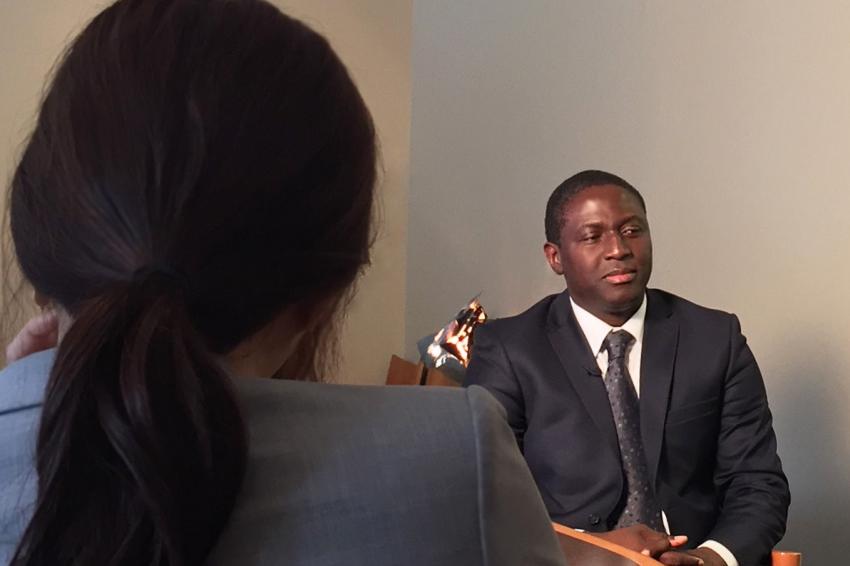Adjovi Discusses UN Panel Opinion on Assange Hearing

Adjovi being interviewed by Reuters on Feb. 5.
News outlets around the world turned their eyes to Arcadia on Feb. 5, after the United Nations Working Group on Arbitrary Detention released its public statement that WikiLeaks founder Julian Assange was arbitrarily detained by the United Kingdom and Sweden. Roland Adjovi, assistant professor of historical and political studies, spoke with several global news organizations as the second vice chairman of the Working Group.
The Working Group announced its decision in favor of Assange’s arbitrary detention in the Ecuadorian Embassy in London for over three years, and called for British and Swedish authorities to end Assange’s “deprivation of liberty.”
“[Working with the UN,] you feel like you are on a mission to improve the world,” Adjovi said. “The Working Group is very important because it has a geographical scope that is large, and it’s based on the UN charter. Additionally, it’s flexible enough to be easy for access to victims worldwide.”
The statement suggested Assange be released from his arbitrary detention, have free mobility, and be compensated. Although many have called this ruling into question, Adjovi said the panel’s job was to look at Assange’s current situation and how long he had been detained. They found that because Sweden had pressed no formal charges against Assange, and he was only going to be extradited so he could be interviewed as a person of interest, the UK and Sweden had violated his rights and arbitrarily detained him.
“All the decision is saying is, if you want to prosecute someone, you need to do your investigation and get evidence against a person, so you get a personal trial, and it comes to an end,” Adjovi said. He said that had the prosecutor charged Assange with a crime, rather than issue a warrant for his arrest for an interview, the outcome might have been different. “Rights have to be actually realized. We need to provide objective conditions for you to enjoy your rights. If we create conditions where you cannot enjoy your rights, it’s already a violation.”
Adjovi has been a member of the Working Group since his appointment in May 2014, and he became the second vice chairman in April 2015. Previous to joining the Working Group, Adjovi worked with the UN from 2003 to 2009 and was part of the Rwanda tribunal and on the International Criminal Courts.
In developing early drafts of the public statement, Adjovi was assisted by research assistants Alyssa Barilotti ’16 and Zachary Sturiale ’17. Adjovi said it was important to have outside opinions for the decision, to keep the “common sense” in such a critical issue.
“He asked us to read it over before he brought it to the Working Group, so he could get some non-legal people to look over the paper,” said Sturiale, a political science major. “We reviewed [the statement] to see if it made sense to us, because he reads it over like a lawyer.”
“They were able to say, ‘Yes, this makes sense. It’s not something only lawyers will understand,’ and that was very important,” Adjovi said. “It means I have produced something that is impressionable upon everyone who reads it. Whether people agree or not, at least they can understand it.”
Student Involvement
Adjovi presented Barilotti and Sturiale with the facts of the case, encouraging them to reach their own conclusions. They researched laws, previous cases, and the nature of the detainment. Working on the case instilled an important lesson in trusting immediate reactions.
“Morally…you have an idea of [Assange] in your head, because you listen to the media and things like that, and I didn’t know too much about his legal proceedings beforehand,” said Barilotti, an international studies and French major.
Complicating it further are the allegations of sexual assault against Assange, which makes the idea of his being arbitrarily detained even more unlikely. But, after researching the case further, deepening their understanding of the legality of detention and recognizing the importance of upholding human rights, the students agreed: the Working Group’s conclusion made sense.
“Zach and I both started off saying that we don’t think it’s arbitrary detention, but the research we conducted changed our opinion,” said Barilotti. “I think that’s how it’s supposed to be. Once you become more informed, you adapt and change your opinion.”
They have learned the importance of viewing things objectively, said Barilotti, of recognizing that every case has two sides, and that being innocent and being arbitrarily detained are two separate statements.
Being among the first to read such a high profile, and controversial, opinion has brought the pair into the inner circle of a worldwide story. Adjovi always treated them as insiders, both said, and talked to them about the case so openly that, when the news broke, they weren’t reading anything they didn’t already know. But, the insider status is merely an added perk.
“[Working on the case] has shown me the dedication of human beings toward the betterment and protection of other human beings,” said Barilotti. “I’m proud to work with him and to call him my research professor.”


